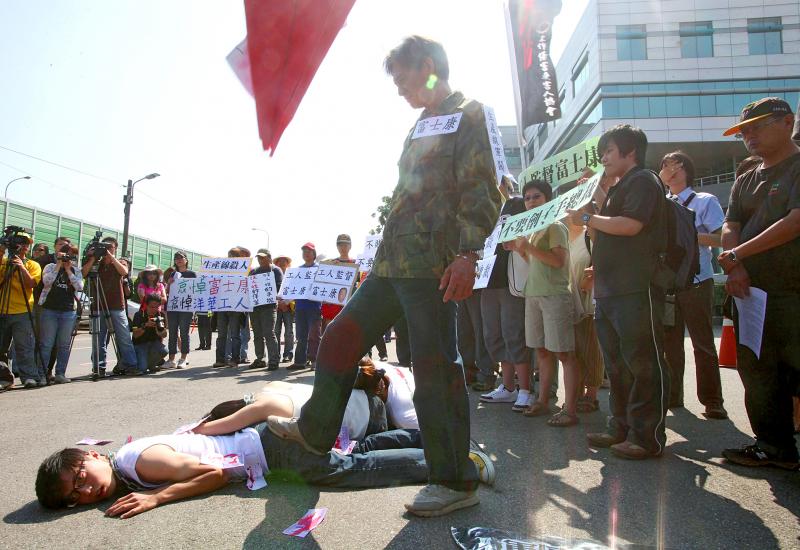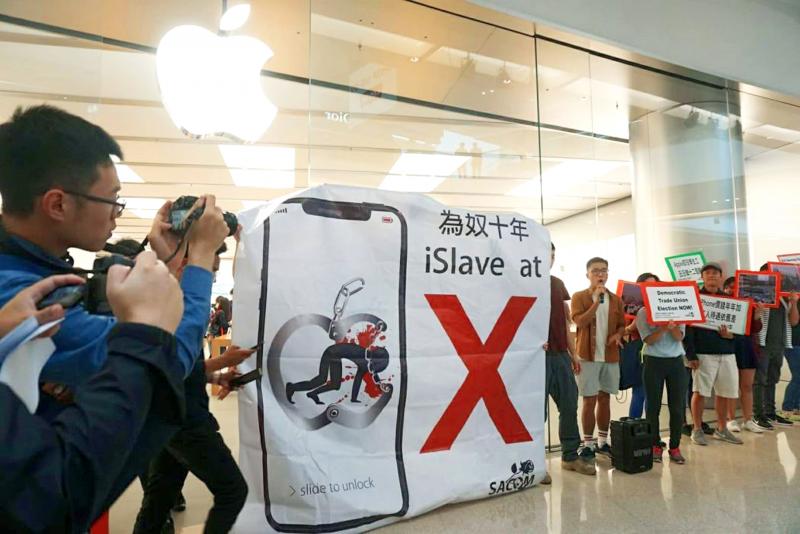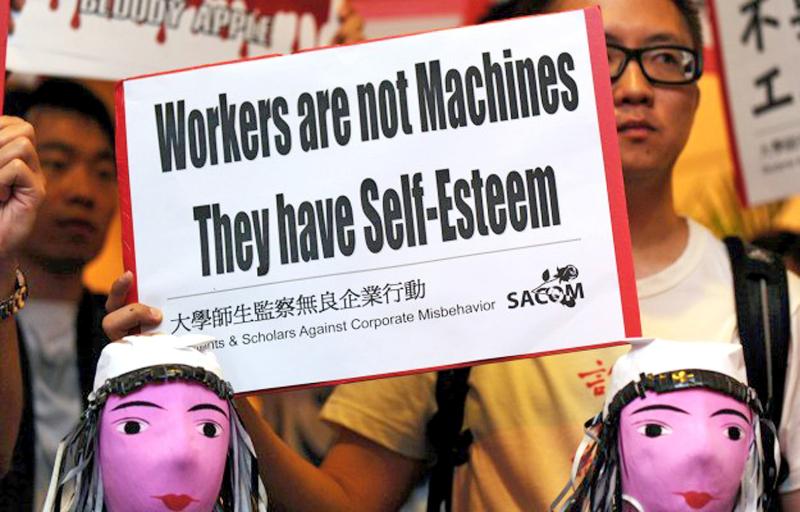Few companies have had their names dragged through the mud so comprehensively as Foxconn Technology Group (富士康科技集團), a conglomerate known as Hon Hai Precision Industry Co (鴻海精密) in Taiwan, which operates vast factories in China and other countries.
The first time many people outside of Taiwan heard of Foxconn — the world’s largest manufacturer of consumer electronics — was in 2010, when a string of employee suicides attracted global interest.
The company’s notoriety grew when it emerged that its response to the deaths included installing nets around staff dormitories to catch suicidal workers. The reports also created a public-relations disaster for Foxconn’s best known client, Apple.

Photo: Wang Min-wei, Taipei Times
Foreign media eventually shifted their attention elsewhere, but labor activists have been determined to keep up the pressure.
One of Foxconn’s most high-profile critics is Jenny Chan (陳慧玲), an assistant professor of sociology at Hong Kong Polytechnic University and an advisor to Electronics Watch (EW), an independent monitoring organization that brings together public-sector buyers and civil society groups to achieve greater sustainability in the electronics industry.
“How can we protect workers from being squeezed and forced to accept poverty wages, when manufacturers are trying to cut costs and stay flexible in the supply chain?” asks Chan, co-author of Dying for an iPhone: Apple, Foxconn and the Lives of China’s Workers.

Photo courtesy of Students and Scholars Against Corporate Misbehavior
Neither Foxconn nor Apple responded when asked if they wished to comment on the issues Chan raises.
PRESSURED WORKERS
According to Chan, there are a number of reasons why Foxconn’s managers put so much pressure on their workers. The conglomerate sees labor discipline as essential if it’s to win high value-added orders, she says.

Photo courtesy of Students and Scholars Against Corporate Misbehavior
Like many companies, Apple operates on a “just in time” basis to minimize inventory carrying costs, so its suppliers must be able to ramp up output ahead of product launches and peak sales periods. Compulsory overtime is frequent, and workers are sometimes denied leave, Chan says.
Until 2010, Foxconn was the exclusive manufacturer of iPhones and iPads. However, in recent years, Apple (and other big buyers, like Amazon) have been splitting orders between Foxconn and its competitors so as to spread risk. Pegatron Corp (和碩) and Wistron Corp (緯創), both Taiwanese companies, have received big orders from Apple — and neither has an unblemished record as regards to labor issues.
Amid the rapid aging of China’s population, there’s a growing reluctance among the country’s young people to accept factory jobs. However, the labor shortage doesn’t seem to have put those who are willing to work for Foxconn in a position to bargain for better conditions. If anything, it’s a factor behind some of the company’s worst practices, Chan says.
Since 2010, Foxconn has boosted salaries and improved facilities in staff dormitories — but production-line workers still lack free time in which they can enjoy those amenities. Twelve-hour shifts are the norm, and it’s not uncommon for workers to have just one day off in a month, says Chan, who interviewed former and current Foxconn employees in Shenzhen, Chongqing and Chengdu during extensive research trips between 2011 and 2019.
Such work rosters breach both China’s labor law limits (which stipulates that overtime on top of an eight-hour shift not exceed 36 hours per month) and Apple’s own Supplier Code of Conduct (which sets a maximum work week of 60 hours, and states that workers must have “at least one day off every seven days except in emergencies or unusual situations”).
In Chan’s opinion, one of Foxconn’s most egregious practices is the recruitment of vocational-school students as “interns.” She stresses that Foxconn isn’t the only manufacturer doing this; Pegatron and Wistron similarly rely on interning students.
Each year, nearly 16 million student interns enroll in vocational secondary schools, according to China’s Ministry of Education, and students as young as 16 temporarily join the workforce in the name of “internships.”
The availability of interns weakens the bargaining position of regular employees, while making employers less inclined to take steps that might improve retention, Chan believes. She describes the use of students as “a kind of forced labor.”
Completing internships is a graduation requirement for vocational-school students, but Chan has discovered that they learn next to nothing on the assembly line.
“They screw in screws or check packaging. There’s no evidence of skills training. Foxconn simply wants more hands in its factory, and it treats the students as cheap, energetic and obedient labor, ignoring their educational rights as well as their labor rights. Interns tell us they’re so angry about their time being wasted, and they complain about the impact working so hard has on their health,” she says.
By law, interns can be paid as little as 80 percent of the company’s basic wage, because their legal status is that of students, and they’re assumed to be less productive than regular employees. Foxconn saves a considerable additional amount of money because there’s no requirement to enroll interns in state pension and benefits schemes. What’s more, interns have no right to a formal employment contract.
Since April 2016, following the implementation of China’s internship regulations, Foxconn’s own rules have stipulated that interns under 18 should work no more than eight hours per day, do day shifts only and work in a safe environment with proper protective gear.
“But, in reality, Foxconn violates its own regulations. Local governments compel schools to meet factories’ needs. There’s deep-rooted corruption and collusion,” says Chan, who’s interviewed local officials and teachers as well as students.
According to Chan, when Apple or other brands say they care about the freedom to associate — which is guaranteed by Apple’s Supplier Code of Conduct — their words “are purely cosmetic.”
VENEER OF HELPING
Independent labor organizations aren’t permitted in China, and Chan does not place much hope in the country’s state-sanctioned unions to protect workers’ rights and interests.
“They’re part of the [Chinese] Communist Party’s monopoly on civil society. While some union officials advocate pro-labor legislation in an attempt to maintain social and political stability, they suppress worker self-organizations,” she says.
She adds that labor rights activists and media have exposed bad practices, but Apple tells their customers and shareholders that they have a comprehensive system.
“Everything looks perfect on paper, but there’s no system to collate workers’ views,” Chan says.
Chan and her allies in EW call for “a worker-driven mechanism through which they can communicate their demands and monitor progress,” calling it “a fundamental worker-empowerment strategy.”
China seems to be becoming more not less authoritarian. Acutely aware of the shrinking space for grassroots organizing, Chan believes campaigning by watchdogs like EW may offer the best hope for progress.
“Since 2015, EW has been asking public-sector entities such as universities to use their leverage to hold tech brands accountable. Our goal is to make the transnational electronics supply chain more transparent, and to give workers more dignity. Transparency means understanding working conditions, wages, training, promotion prospects,” says Chan.
“I also hope global consumers — individual and institutional — will develop greater awareness. Ultimately, workers should exercise their power to unionize and bargain collectively.”

In the next few months tough decisions will need to be made by the Taiwan People’s Party (TPP) and their pan-blue allies in the Chinese Nationalist Party (KMT). It will reveal just how real their alliance is with actual power at stake. Party founder Ko Wen-je (柯文哲) faced these tough questions, which we explored in part one of this series, “Ko Wen-je, the KMT’s prickly ally,” (Aug. 16, page 12). Ko was open to cooperation, but on his terms. He openly fretted about being “swallowed up” by the KMT, and was keenly aware of the experience of the People’s First Party

Aug. 25 to Aug. 31 Although Mr. Lin (林) had been married to his Japanese wife for a decade, their union was never legally recognized — and even their daughter was officially deemed illegitimate. During the first half of Japanese rule in Taiwan, only marriages between Japanese men and Taiwanese women were valid, unless the Taiwanese husband formally joined a Japanese household. In 1920, Lin took his frustrations directly to the Ministry of Home Affairs: “Since Japan took possession of Taiwan, we have obeyed the government’s directives and committed ourselves to breaking old Qing-era customs. Yet ... our marriages remain unrecognized,

Not long into Mistress Dispeller, a quietly jaw-dropping new documentary from director Elizabeth Lo, the film’s eponymous character lays out her thesis for ridding marriages of troublesome extra lovers. “When someone becomes a mistress,” she says, “it’s because they feel they don’t deserve complete love. She’s the one who needs our help the most.” Wang Zhenxi, a mistress dispeller based in north-central China’s Henan province, is one of a growing number of self-styled professionals who earn a living by intervening in people’s marriages — to “dispel” them of intruders. “I was looking for a love story set in China,” says Lo,

During the Metal Ages, prior to the arrival of the Dutch and Chinese, a great shift took place in indigenous material culture. Glass and agate beads, introduced after 400BC, completely replaced Taiwanese nephrite (jade) as the ornamental materials of choice, anthropologist Liu Jiun-Yu (劉俊昱) of the University of Washington wrote in a 2023 article. He added of the island’s modern indigenous peoples: “They are the descendants of prehistoric Formosans but have no nephrite-using cultures.” Moderns squint at that dynamic era of trade and cultural change through the mutually supporting lenses of later settler-colonialism and imperial power, which treated the indigenous as